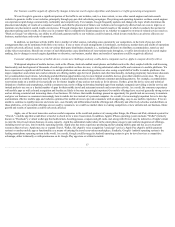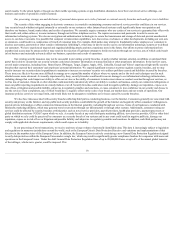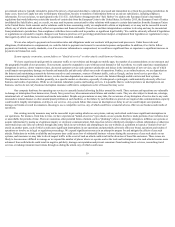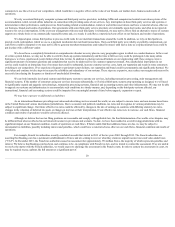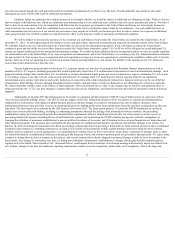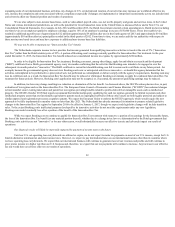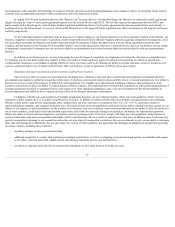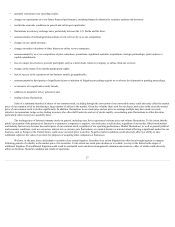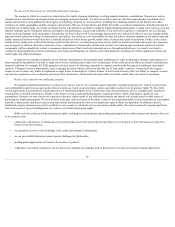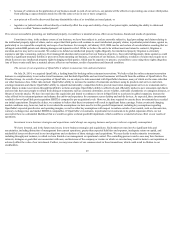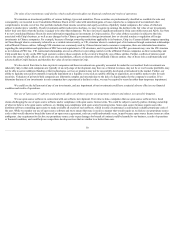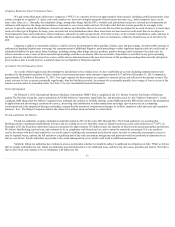Priceline 2015 Annual Report Download - page 29
Download and view the complete annual report
Please find page 29 of the 2015 Priceline annual report below. You can navigate through the pages in the report by either clicking on the pages listed below, or by using the keyword search tool below to find specific information within the annual report.
• difficulties in transferring funds from or converting currencies in certain countries; and
• reduced protection for intellectual property rights in some countries.
Our business has grown substantially over the last several years and continues to expand into new geographic locations. In addition, we have made efforts
and expect to make further efforts to integrate access to travel services across our various brands. These changes add complexity to legal and tax compliance, and
our increased size and operating history may increase the likelihood that we will be subject to audits by tax authorities in various jurisdictions.
We face increased risks as the level of our debt increases.
We have a substantial amount of outstanding indebtedness and we may incur substantial additional indebtedness in the future, including through public or
private offerings of debt securities. Our outstanding indebtedness and any additional indebtedness we incur may have significant consequences, which could
include:
• requiring the dedication of a portion of our cash flow from operations to service our indebtedness, thereby reducing the amount of cash flow available for
other purposes, including capital expenditures, share repurchases and acquisitions;
• increased vulnerability to downturns in our business, to competitive pressures and to adverse changes in general economic and industry conditions;
• decreased, or loss of, the ability to obtain additional financing on terms acceptable to us for working capital, capital expenditures, acquisitions, share
repurchases or other general corporate purposes; and
• decreased flexibility when planning for or reacting to changes in our business and industry.
Our ability to make payments of principal of and interest on our indebtedness depends upon our future performance, which will be subject to general
economic conditions, industry cycles and financial, business and other factors affecting our consolidated results of operations and financial condition, many of
which are beyond our control. Further, we may not have access to equity or debt markets or other sources of financing, or such financing may not be available to us
on commercially reasonable terms, to repay or refinance our debt as it comes due or, in the case of our convertible notes, upon conversion. If we are unable to
generate sufficient cash flow from our U.S. operations in the future to service our debt, we may be required to, among other things, repatriate funds to the United
States at substantial tax cost.
"Cookie" laws could negatively impact the way we do business.
A "cookie" is a text file that is stored on a user's web browser by a website. Cookies are common tools used by thousands of websites, including ours, to,
among other things, store or gather information (e.g., remember log-on details so a user does not have to re-enter them when revisiting a website), market to
consumers and enhance the user experience on a website. Cookies are valuable tools for websites like ours to improve the customer experience and increase
conversion on their websites.
The European Union's ePrivacy Directive requires member countries to adopt regulations governing the use of "cookies" by websites servicing consumers
in the European Union. For example, on June 5, 2012, an amendment to the Dutch Telecommunications Act became effective. The amended act requires websites,
including Booking.com, to provide Dutch users with clear and comprehensive information about the storage and use of certain cookies and obtain prior consent
from the user before placing certain cookies on a user's web browser. To the extent any such regulations require "opt-in" consent before certain cookies can be
placed on a user's web browser, our ability, in particular Booking.com's ability, to serve certain customers in the manner we currently do might be adversely
affected and our ability to continue to improve and optimize performance on our websites might be impaired, either of which could negatively affect a consumer's
experience using our services. As a result, these regulations could have a material adverse effect on our business, market share and results of operations.
Our stock price is highly volatile.
The market price of our common stock is highly volatile and is likely to continue to be subject to wide fluctuations in response to factors such as the
following, some of which are beyond our control:
• operating results that vary from the expectations of securities analysts and investors;
26



